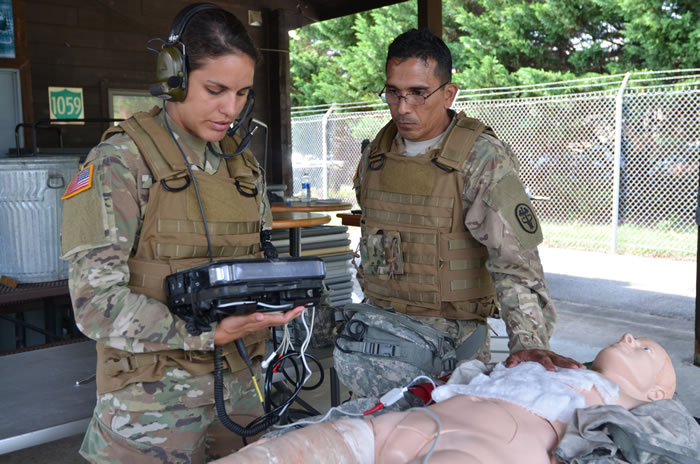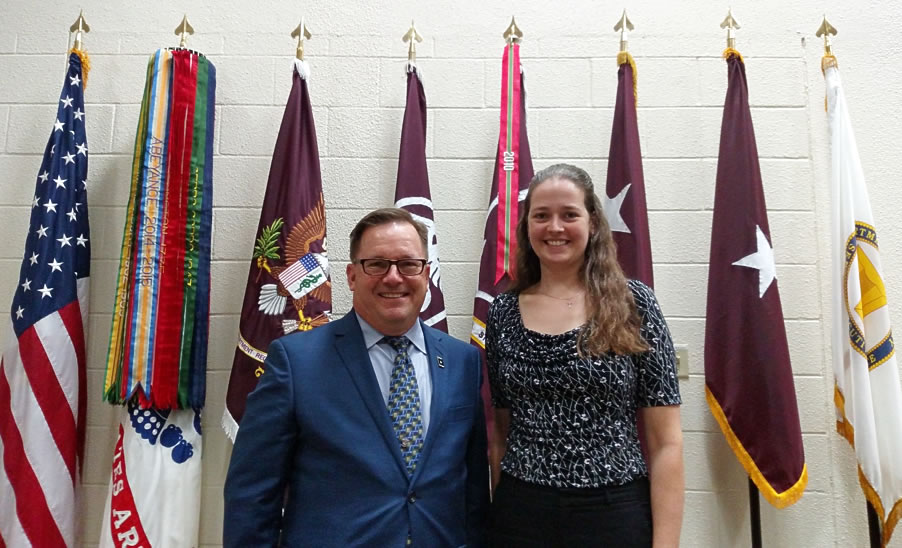The Unmeasurable Value of a Mentor

The Army Medical Department recognizes the value of a mentorship program as a tool for organizational learning. AMEDD aims to invest in employees with the ability, aptitude, and desire to grow and develop their leadership skills both personally and professionally through the U.S. Army Medical Command (MEDCOM) Mentorship Program.
The MEDCOM Mentorship Program allows those with experience and knowledge to provide guidance and share information with a more junior colleague. The pilot year for the MEDCOM Mentorship Program was 2016.
The AMEDD Civilian Corps Professionals began their year-long mentorship journey in 2017 and the MEDCOM Mentorship Program had 16 graduates on Sept. 14, 2018. One of the graduates was Dr. Rebecca Fellin, Biomedical Engineer (Biomechanics) U.S. Army Medical Research Institute of Environmental Medicine, Natick, Massachusetts.
Fellin said, "As a junior researcher, I have a strong interest in growing my personal area of research which requires cultivating my leadership skills. As a civilian without a military background, I want to increase my knowledge of Army culture to work effectively with both Soldiers and civilian employees. The mentorship program offered an external mentor to provide guidance and who was able to work with me to create a roadmap for achieving my goals."
When asked what she gained from participating in the mentorship program, Fellin said, "The dedicated time to focus on becoming a better leader as part of the mentorship program enabled me to take ideas I learned and apply them to my situation, striving to foster more effective research that benefits Soldiers. I felt I expanded my leadership skills to more effectively collaborate with scientists and I learned about the Army's command structure and culture."

"My mentor, David Bitterman, guided me through a leadership program he teaches, and I learned quite a bit about myself and how I needed to improve as a leader to become a better scientist," she continued. "Additionally, I was a mentor to someone in a different career field as part of the mentorship program. That experience taught me how to coach someone to identify one's vision and long term goals to help them create a roadmap for achieving those goals."
Fellin added, "The MEDCOM Civilian Corps Office provided webinars to encourage strategic thinking, build empathy and sensitivity, and improve conflict resolution. It also provided in-person training at the start and end of the program to build leadership, coaching, feedback and briefing skills." As part of the program, Fellin completed quarterly assessments and met with her mentor about once a month.
"The best part about the mentorship program was the flexibility to assess my career goals and tailor my personal and professional development to reach my goals," Fellin said. "My mentor is a retired colonel and educator in leadership at Army Medical Department Center and School. His expertise and willingness to provide feedback helped me grow my leadership capabilities."
There were also three individuals recognized as Mentors and Senior Mentors for volunteering their time during the year-long journey:
- Douglas Davis, Program Coordinator, Fort Detrick, Maryland
- Dawn Rosarius, Acting Principal Assistant for Acquisition, U.S. Army Medical Research and Materiel Command, Fort Detrick, Maryland
- Daniel Saenz, Director, Business Operations, Health Facility Planning Agency HFPA/G9 MEDCOM

Saenz served over 11 years on active duty in the Army as a Military Police Officer. He attended the yearlong Executive Potential Program through the Graduate School USA and during those 12 months, learned the importance of mentoring employees and providing positive feedback to them.
"Last year, the AMEDD mentorship program provided mentorship and senior mentorship to four AMEDD civilians across the world," said Saenz. "I enjoyed the 12-month mentorship program so much that I volunteered to mentor and senior mentor five new employees for another 12 months."
When asked if he would recommend the program, Saenz said, "I would absolutely recommend the AMEDD Mentorship Program to anyone who wants to progress in their civilian career. I was able to mentor GS6-GS12s and I was able to provide valuable input to their professional development and in helping AMEDD build the talent bench for the future."
"I hope that the AMEDD Mentorship Program grows and is able to provide more mentorship to more employees within MEDCOM," he continued. "This program is great for new or mid-career civilians to get the mentorship needed in order to navigate the intricacies of being a Department of the Army civilian."
The new group of mentors and senior mentors who have volunteered their time for the upcoming year were also recognized, including Rajal Ganatra, General Engineer, Fort Detrick, Maryland. Mentors are grades GS 10-13 and equivalent and Senior Mentors are grades GS 14-15 or equivalent. Ganatra will serve as both a Mentor and a Senior Mentor.
Ganatra said that she is still benefitting from formal and informal mentors she has come across professionally during different stages of her life. "I feel now it's time for me to return this back to the community by sharing knowledge and experience I have gained so far to a Mentee to grow personally and professionally," she stated.
When asked what she hopes to gain from participating in the mentorship program, Ganatra said personal satisfaction, enhancement of management and leadership skills, and networking are at the top of her list. "And yes, good karma," she added.
 An official website of the United States government
An official website of the United States government
 ) or https:// means you've safely connected to the .mil website. Share sensitive information only on official, secure websites.
) or https:// means you've safely connected to the .mil website. Share sensitive information only on official, secure websites.


